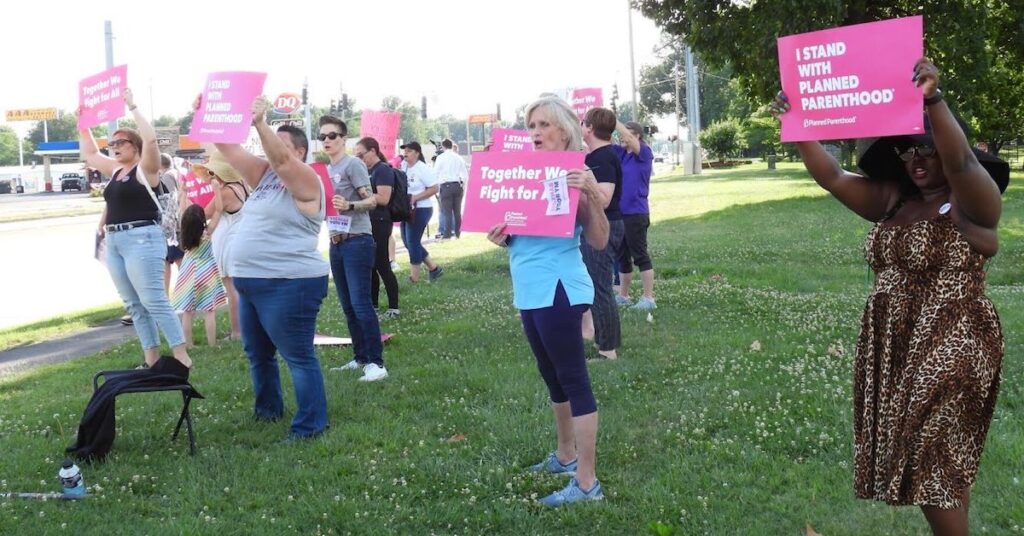With abortion’s legal status in Kentucky being litigated after the U.S. Supreme Court’s decision to overturn Roe v. Wade rendered it illegal in nearly every instance in the state, leadership for the state’s abortion funds say they will remain committed to financially supporting people seeking the procedure.
Several Kentucky reproductive rights groups – including Planned Parenthood Alliance Advocates, the Kentucky Health Justice Network (KHJN) and the A Fund, among others – are continuing to pool funds to support abortion seekers.
These groups have provided hundreds of thousands of dollars in financial support to abortion seekers in the state over the past year and KHJN executive director Erin Smith says that number will only go up if people need to travel out of the state for the procedure, due to Kentucky’s pending restrictions on nearly all abortions.
“We just basically had our Supreme Court give the middle finger to everyone who is able to be pregnant or become pregnant,” they said. “So there’s a lot of feeling of neglect and abandonment, you know, people have lost faith in this country’s values because of this. We have to do the best we can with what we have.
“We are doing it with the assistance of other abortion support networks and funders across the region and that’s the best way we can handle it – just reaching out into our network making sure we can have some ability to have like, to make sure that Kentuckians have accessible, safe and healthy abortions.”

KHJN helps people coordinate and pay for appointments, travel, lodging, and other needs, like groceries and childcare, that could come with getting an abortion in Kentucky or outside its borders.
The A Fund – Kentucky’s longest running abortion fund – only funds the procedure itself.
Planned Parenthood networks with KHJN, the A Fund and other organizations to connect abortion seekers with as many resources as possible, even providing patient navigators to aid with logistical needs like securing an appointment in a safe, legal facility and travel and lodging arrangements as well as securing financial aid.
Tamarra Wieder is the state director for Planned Parenthood Alliance Advocates.
“We know that the barriers that were put in place you know, before Roe fell were already so difficult and insurmountable for some Kentuckians trying to obtain abortion care,” she said. “These are only going to be compounded now as they have to travel further for life-saving, life-affirming services and abortion funds need all the support that they can get right now because they are doing everything in concert with the clinics across the borders to make sure that Kentuckians still have care.”
A Fund president Kate Cunningham has been active in the fight for reproductive rights in Kentucky since the 1970s and she was deeply saddened by Roe’s overturning.
“It’s terrible for women my age to see what has happened to access that we thought was assured for 50 years. It’s never been very easy in Kentucky,” she said. “The legislature has erected one hurdle and barricade after another, but it was still available. It was still possible to jump through the hoops and manage to get an abortion. And now it is not.”
Smith says the KHJN team got a preview of what working conditions post-Roe would be like in March when House Bill 3 was overridden, temporarily outlawing abortion in Kentucky until an injunction was filed later that month.
“For Kentucky, you know, it’s been just so many like double whammies here in terms of just how far the opposition is willing to go to make sure to that people don’t have access to abortion,” Smith said. “The closest states around us, they’re gonna get flooded [with appointment requests] as we see half the country shut down and have anti-abortion legislation and more anti-abortion legislation coming up.”
Wieder expects to see “further legislation that attacks [Kentuckians’] ability to make the best choices for [themselves],” including contraception access in the near future.
Smith and Wieder are both concerned about a potential amendment to Kentucky’s state constitution on the ballot this November. If approved, it could ensure abortion rights aren’t protected under state law.
Wieder says 73 of Kentucky’s 120 counties don’t have practicing OBGYNs. She says a long-term abortion ban could compound issues stemming from a lack of access to reproductive care.
“That disparity is the greatest in the western, the western and eastern parts of our Commonwealth. These bans directly impact these individuals directly, impact their reproductive health care and continue to marginalize and cut them off.”
Cunningham, too, is fearful about where this path of potential legislation could lead.
“If women do not have control over their own reproductive futures, they don’t have control over any aspect of their lives. And,. as the old stereotype has it, some people want to keep women at home, barefoot and pregnant and that’s what we’re headed for.”
Cunningham, Smith and Wieder all said they’ve seen outpourings of support from across the state and nation in the wake of Roe being overturned. For Smith, the influx of donations has been bittersweet.
“We have definitely felt the love and support of our community. It’s been wonderful to see, but also, it comes at a time where we are all mourning,” they said. “We are all grieving the overturning of Roe and we are also still fearful of what could happen next.”
Smith said KHJN distributed over $160,000 in aid during the last fiscal year and Cunningham said the A Fund gave out over $170,000. Both expect the total aid distributed to increase if abortion seekers will need to travel out of state to receive safe, legal care.
Though Wieder wasn’t surprised by the chain of events that brought the state to this point, that hasn’t made it any less devastating. She attended rallies across the state in the aftermath of the Supreme Court decision last week.
“One thing that I consistently heard was fear … fear and anger. People were so afraid. There’s so much misinformation out there. They were afraid that seeking support could land them in jail, they were afraid about sharing information on their rapes,” she said. “They were afraid about what more violations to their bodily autonomy were being planned in Frankfort. And there is this overwhelming sense of what’s next and that fear is palpable.”



